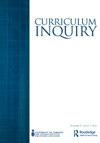Collective memory and the transatlantic slave trade: Remembering education towards new diasporic connections
IF 1.6
3区 教育学
Q2 EDUCATION & EDUCATIONAL RESEARCH
引用次数: 0
Abstract
Abstract In countries from which enslaved Africans were forcibly taken to the new world, critical discussion of the Transatlantic Slave Trade (TST) and its Diaspora remains elusive, especially in educational spaces. Ghana is one such country that is deeply connected to the TST and yet struggles to engage it in the social studies syllabus. This article contributes to this literature by using a single instrumental case study approach to interrogate the inherent contradictions in Ghana’s collective remembering of the TST and its Diaspora in the junior high school (JHS) social studies syllabus. Using data from nine interviews and a directed content analysis of the 2007–2019 JHS social studies syllabus, I find that while the syllabus highlights the TST, it fails to critically and deeply engage students on either the TST or its Diaspora. Rather, it situates the TST as a minor event in the broader and monumental colonial, anti-colonial, and post-independence narratives. Ultimately, this creates misinformation and ignorance about the TST and its Diaspora among Ghanaian youth, further facilitating a disconnection between them and the TST’s Diaspora. In the article, I discuss broader implications for African and African Diaspora relationships and solidarity. I recommend a critical collective remembering (CCR) approach to teaching the TST which comprehensively highlights actors, victims, survivors, counter-narratives, and contemporary implications. CCR uses relevant creative, technology-based, and collaborative pedagogical and dialogical methods to make this history and social studies education relevant and meaningful for the younger generation.集体记忆和跨大西洋奴隶贸易:记住新的散居联系的教育
摘要在被奴役的非洲人被强行带到新世界的国家,对跨大西洋奴隶贸易及其流散的批判性讨论仍然难以捉摸,尤其是在教育领域。加纳就是这样一个与TST有着深厚联系的国家,但却很难将其纳入社会研究大纲。本文通过使用单一的工具性案例研究方法来质疑加纳在初中社会研究教学大纲中对TST及其散居者的集体记忆中的内在矛盾。使用九次访谈的数据和对2007-2009年JHS社会研究教学大纲的直接内容分析,我发现虽然教学大纲强调了TST,但它未能批判性地、深入地让学生参与TST或其散居者。相反,它将TST定位为更广泛和不朽的殖民、反殖民和独立后叙事中的一个小事件。最终,这在加纳青年中制造了关于TST及其散居者的错误信息和无知,进一步助长了他们与TST散居者之间的脱节。在这篇文章中,我讨论了对非洲和非洲侨民关系和团结的更广泛影响。我建议采用批判性集体记忆(CCR)方法来教授TST,全面强调演员、受害者、幸存者、反叙事和当代含义。CCR使用相关的创造性、技术性和协作性的教学和对话方法,使这种历史和社会研究教育对年轻一代具有相关性和意义。
本文章由计算机程序翻译,如有差异,请以英文原文为准。
求助全文
约1分钟内获得全文
求助全文
来源期刊

Curriculum Inquiry
EDUCATION & EDUCATIONAL RESEARCH-
CiteScore
3.10
自引率
17.60%
发文量
37
期刊介绍:
Curriculum Inquiry is dedicated to the study of educational research, development, evaluation, and theory. This leading international journal brings together influential academics and researchers from a variety of disciplines around the world to provide expert commentary and lively debate. Articles explore important ideas, issues, trends, and problems in education, and each issue also includes provocative and critically analytical editorials covering topics such as curriculum development, educational policy, and teacher education.
 求助内容:
求助内容: 应助结果提醒方式:
应助结果提醒方式:


